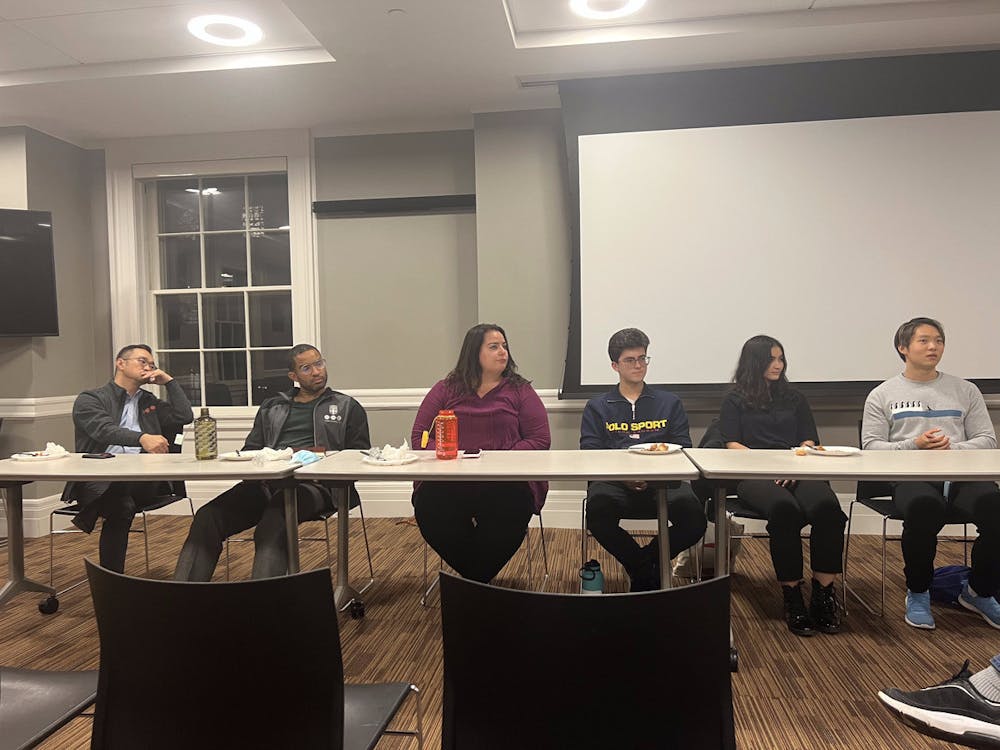The Undergraduate Council of Students hosted a town hall meeting with Student Activities Office staff and Undergraduate Finance Board student representatives on Wednesday to address student questions about the funding of campus groups.
Joie Steele, senior associate dean and director of student activities, began the meeting by outlining the structure of the SAO staff, which includes nine full-time members and three part-time staff who assist with student events on Thursday, Friday and Saturday evenings. She also introduced Matt Branch and Ray Seol, both associate directors of SAO.
Discussing a past decline in involvement in student activities on campus, Steele said students are “really conscious” of how they spend their time and are “committing fully to less things” following the COVID-19 pandemic.
“I think we’re seeing students narrow their portfolio … and trying to maintain time to breathe, … which is really healthy,” she said.
Steele also added that in the past year, student events have seen higher attendance rates than “ever before,” which she hopes is a “permanent upswing.” Steele said this enthusiasm can be partially attributed to the dedication of UCS and UFB in providing resources to student groups such as event funding.
“I think (the collaboration between UCS and UFB) has fostered an environment where students are doing more things and have access,” Steele said.
Seol spoke about the “future-oriented” mindset of student groups on campus as they have committed to hosting in-person activities upon pandemic restrictions lifting.
With the rise of in-person activities, UFB has also seen more groups come to them for funding requests, according to UFB Representative Richard Shen ’23. The board gets budget requests from students with a “wide range” of experiences when it comes to finances, Shen said.
“We encourage students to keep (financial) records (such as) inventory sheets so that they know what they already have,” he said. The UFB website is going to be expanded to include resources such as cost and policy templates so student group leaders can be more prepared when meeting with UFB representatives, Shen added.
“We’re trying to standardize everything so people can actually consistently get funding,” UFB Representative Will Borges ’24 said.
SAO and UFB also addressed a question regarding the prospect of a fee-free campus, which would mean eliminating ticketed events.
Borges said UFB’s mission is to fund events for organizations that “align with (its) student group mission.” Tickets for events are often used to offset high expenses that come with holding events that require spaces, costumes or other resources.
While UFB is trying to “move away” from ticketed events, Shen said the board tries to prevent groups’ funding from increasing by more than 20% a year in order to “keep things equal.” UFB tries to communicate with clubs when events may be too expensive to eliminate ticket sales, especially for performance-based groups.
While many student groups currently rely on ticket sales to fund other events, such as group retreats, Shen encourages groups to communicate with UFB to see if they can be supported in “another way (rather) than charging tickets.”
Funding for student groups comes from the student activities fee that all University students pay as part of their tuition, Steele said. UFB will be “running projections” of the next three to five years to see how long the student-activities fee can remain unchanged while fulfilling the recent commitments UFB has made to increasing funding to student groups and club sports.
If UFB thinks that the student activities fee cannot sustain recent financial commitments, it will “recommend an increase,” Steele added.
UCS Vice President Mina Sarmas ’24 brought up a concern of ensuring that application-based student groups uphold a commitment to diversity. Borges said that the anti-discrimination amendment integrated into all student group constitutions “remind(s) student group(s) they should be thinking about anti-discrimination.”
SAO staff members also discussed their role in helping address problems that arise within student groups. Steele said that SAO will connect students with resources to field community dialogue and “focus on group culture.”
“We will work as long as it takes for everyone to feel that improvement has happened,” she added.
Steele also spoke about an “exciting update” to the BearSync spreadsheet, which lists all the University’s student organizations. The spreadsheet will be revamped to make resources more accessible to students navigating the various offerings of groups on campus, Steele explained.
“We are redesigning our website, and the communications team has put together a really beautiful platform for student organization information” which will be rolled out soon, she said.





